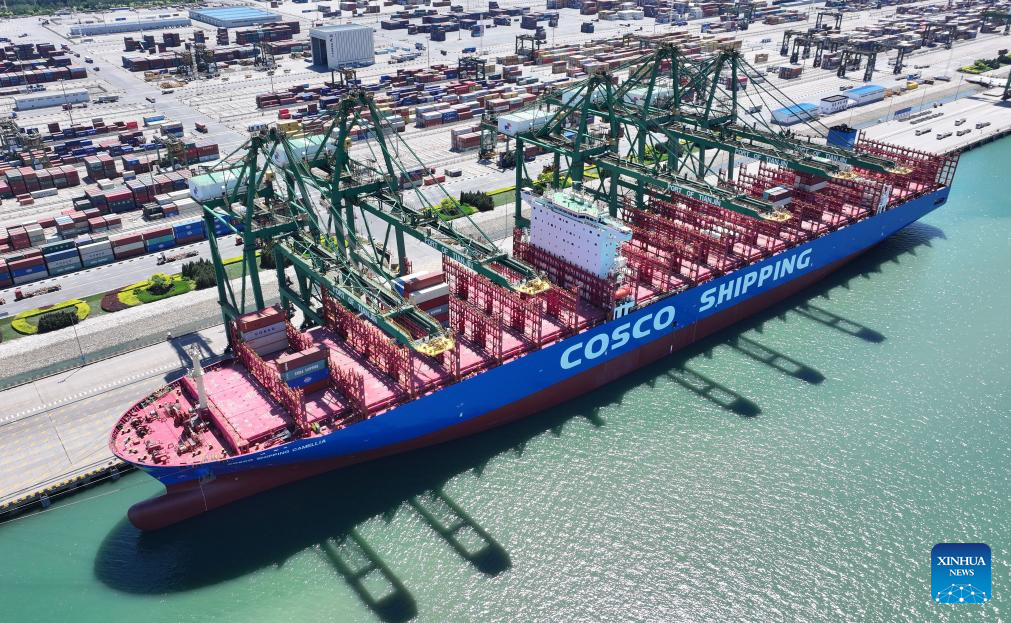By Zhao Chunlei
The 2024 Group of Seven (G7) Summit, scheduled for June 13 to 15, will bring together the leaders of the seven member states along with representatives from the EU. Given that the 2022 and 2023 G7 communiqués mentioned "China" 14 and 20 times, respectively, it is likely that a broad range of "China issues" will once again feature prominently.
In terms of the international economy, recent trade conflicts involving China, the EU, and the U.S., as well as discussions at the recently concluded meeting of G7 finance ministers and central bank governors, have signaled potential topics for the upcoming summit.
First, "overcapacity" could be racked up as a significant topic, as highlighted in the communiqué following the meeting of G7 finance ministers and central bank governors, issued on May 26, 2024, alongside recent U.S. allegations concerning China's electric vehicles, solar cells, and semiconductors industries.
"Overcapacity" is a constant topic in the U.S.'s China bashing in the fields of steel and aluminum. However, there's no evidence supporting such a claim. Under the guise of "overcapacity," on May 14, 2024, the U.S. increased tariffs on different kinds of Chinese clean energy products, with electric vehicle tariffs soaring from 25 percent to 100 percent.
In comparison, take Germany as an example. In 2023, Germany's exports accounted for about 40 percent of its GDP, whereas China's exports in the same year accounted for only about 3 percent of its GDP. Yet, the U.S. does not use the term "overcapacity" to describe Germany. This highlights the double standards of the U.S.
The remarkable advancements in production and quality by Chinese electric automakers should not be an excuse for the label "overcapacity." As Chinese Minister of Commerce Wang Wentao explained, the so-called overcapacity is not an excess of capacity but reflects "excessive anxiety." The hype surrounding "overcapacity," deviating from facts and economic regulations, is protectionism in nature and constitutes a pretext for pressuring China.
Another label that has been employed is "economic coercion," which appears four times in the 2023 G7 communiqué, though not explicitly linked to China. Nevertheless, it has been notably and extensively used by the U.S. and the EU against China since then.
There is no universally accepted definition of "economic coercion." But from the U.S.'s perspective, it means that "China has weaponized the use of trade restrictions, sanctions, embargoes, and boycotts to either incentivize or deter behavior." On the side of the EU, according to its newly introduced Anti-Coercion Instrument, "economic coercion is defined as a situation where a third country attempts to pressure the EU or a member state into making a particular choice by applying or threatening to apply, measures affecting trade or investment against the EU or a member state."
Since the U.S. initiated the trade war against China in 2018, a series of actions have been taken, including imposing punitive duties, enforcing stringent sanctions, restricting exports, and discriminating in investments. Additionally, the EU has recently enacted multiple trade defense measures targeting over ten industries in China. These actions by the U.S. and the EU raise questions about the legitimacy of their allegations, as it is evident that China is the victim of economic coercion.

The container ship COSCO Shipping Camellia berthed at the Pacific International Container Terminal of Tianjin Port in north China's Tianjin, May 15, 2024. [Photo/Xinhua]
Moreover, despite lacking evidence, China is still alleged to have engaged in unfair trade practices by offering high levels of subsidies, enabling Chinese companies to undercut prices and gain market share, thereby resulting in "unfair competition." However, both the U.S. and the EU provide significant subsidies to various sectors with the aim of enhancing competitiveness. For instance, in August 2022, U.S. President Joe Biden signed the Inflation Reduction Act, which explicitly provides subsidies to develop clean energy. Similarly, the EU has introduced a series of stimulus policies, with an average of about 969 subsidy policies per year from 2020 to 2023.
In preserving fair competition, the World Trade Organization (WTO) legal system has been instrumental, prioritizing the fundamental principles of non-discrimination and the reasonable, prudent use of trade remedies. However, there are doubts regarding the conformity of the aforementioned subsidies with WTO standards. Previous G7 communiqués have consistently emphasized adherence to WTO principles, and it is anticipated that this year's document will do the same.
During the upcoming G7 summit, the U.S. may push for other nations to join its tariff war, as U.S. Treasury Secretary Janet Yellen called last month for the formation of "a wall of opposition" against China. However, each G7 member has its own interests, and it is obvious that a trade war is not in the interests of any country, given China's economic ties with each G7 member.
Zhao Chunlei, a special commentator on current affairs for CGTN, is a researcher at the Institute for International Dispute Settlement, Tsinghua University.

 中文
中文



